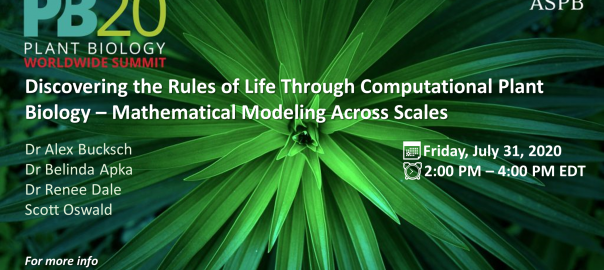
The Online workshop is now on July 31st from 2-4 pm EDT. If you can’t make this, everything will be recorded. Even the workshop exercises will be available afterward, so you only miss out if you don’t sign up. Keep reading if you want to know how I’m taking this online.
Although I had to change the format a bit, we will still be talking about:
1. How to translate a biological problem into a conceptual model 2. A selection of mathematical representations of conceptual models 3. A selection of techniques for simulating or solving mathematical models 4. How these models apply across scales, space, and time

Going Online
Originally, I planned to put people into groups to work on applying mathematical modeling concepts to toy problems. Since this isn’t very feasible with how chaotic online chatting is (really makes you appreciate those little physical social cues), I decided to go with a worksheet format. As we go through the workshop content, short surveys/polls will be sent to participants. Your responses will automatically go into a spreadsheet so we can visualize polls, or view misunderstandings; as well as a document that you can view/edit later. The flow of the workshop questions is intended to reflect what a real scientific modeling flow would look like, so it should be useful if you want to think about modeling a real problem.
We will still have Q&A, problem feedback, and make sure the conceptual understanding is there, but a little more structure since its online.
Workshop Description… but online

At the workshop, participants will be put into groups and provided with ‘toy problems’ to solve. They will be tasked with reformulating of these problems to be more appropriate for discussion of mathematical frameworks, including differential equations, Markov Chains, and cellular automata. Participants groups will decide which of the presented methods would be best suited for their toy problems. The ‘solutions’ will be presented by our panel of experts, who will discuss their rationales with the participants. At the end of the workshop, participants will have the opportunity to receive real-time consultation on their computational questions. Participants can display an A4-sized poster with a diagram of their system with a brief paragraph giving background information and research questions. The panel of experts will then give comments where appropriate on suggested next steps.
More Computational Stuff
If you are a modeler, please think about joining our ECR modeling community! Read more about it here (post will be up 7/1/20), or check out our website: https://amoghpj.github.io/modeling-and-beyond/
If you are interested in being a part of my interdisciplinary collaborative database (soon to be expanded as a forum), please fill out this survey!
testing
testing teh comment font system, hjello.